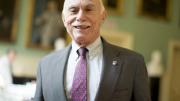The longest-serving dean in Harvard’s history, Michael Shinagel, dean of continuing education and University extension, was honored at a reception in the Faculty Room of University Hall on May 14, prior to his retirement at the end of this academic year. (Huntington D. Lambert, head of continuing education at Colorado State University, succeeds him on July 1.)
At the robustly attended party, Michael D. Smith, dean of the Faculty of Arts and Sciences, produced some archival research to prove that Shinagel was in fact the University’s longest-tenured dean. He had a close rival for that honor, Smith reported: Bernice B. Cronkhite ’16 served, like Shinagel, for 36 years, retiring in 1959—but she held two different decanal jobs, first as dean of Radcliffe College, then as dean of its graduate school. Furthermore, Smith explained, Cronkhite took office on September 1, whereas Shinagel became dean on July 1 (in 1977, after serving for two years as director), giving him seniority. Loud applause greeted this revelation.
Former Harvard president Derek Bok rose and recounted how the Extension School had grown prodigiously under Shinagel’s leadership. At Commencement in the mid 1970s, it was hard even to find the Extension School degree candidates in the Tercentenary Theater throng, Bok said, but today they are a robust crowd of graduates who “might even surpass the Business School” in their vociferous enthusiasm. Henry Rosovsky, Geyser University Professor emeritus, who spoke next, cited Shinagel’s status as the “best-dressed” Harvard professor, bar none. He also praised his leadership in both expanding the Extension School’s reach and developing the possibilities of online education; in Rosovsky’s view, the dean had made Harvard into a model that other institutions seek to follow.
Shinagel’s own remarks displayed his much-admired sense of humor. He quoted a Harvard psychiatrist who declared at his own retirement party, years ago, that “anyone who claims to be happy at Harvard is in denial.” Shinagel affirmed that view, explaining that this was inevitable given the University’s Puritan heritage; he cited H.L. Mencken’s definition of Puritanism as “the haunting fear that someone, somewhere, may be happy.” Nonetheless, the rest of Shinagel’s speech, as well as his 38 Crimson years, stood in clear reproof of this premise. He recalled leaving Rosovsky’s office in 1975 after settling the details of his appointment, and getting the latter’s final admonition: “Don’t embarrass us!” The evidence of the hundred-plus guests in attendance suggested that Shinagel had instead brought abundant honor and success to Harvard.









